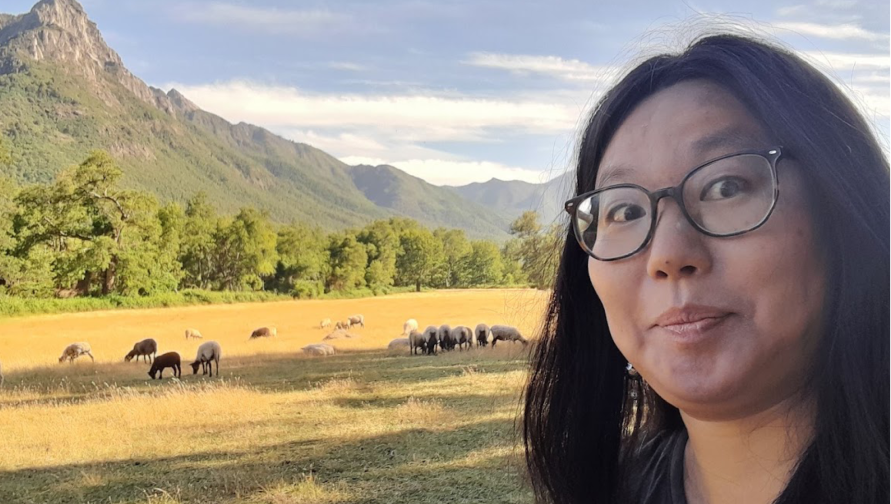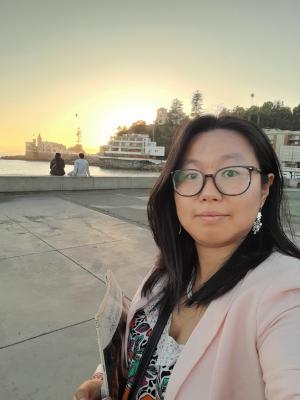
By Isabel Wu, Ph.D. candidate in history
Isabel Wu is a Ph.D. candidate in history researching the iconic Chilean women’s magazine Paula, a well-known publication in which Isabel Allende started her writing career. Last summer, with the support of UC Irvine’s Department of History, the Humanities Center, and the Center for Global Peace and Conflict Studies, Wu returned to Chile (her third trip back!) to interview editors and journalists about the magazine. With the encouragement of Heidi Tinsman, her dissertation advisor, Wu is preparing to once again travel to Chile in order to participate in a panel presentation at the National Library about her advocacy around the Paula archives.
Starstruck conversations
I spent four months in Chile from September 2023 to January 2024 – which turned out to be nothing short of an adventure. From hanging out with Givenchy, Balenciaga and Miuccia – the famous cats of a fashion historian – to almost getting almost kicked out of her house for my subpar Spanish by an award-winning journalist, to herding sheep in the absconded hinterland in central Chile, my research journey was eventful, entertaining and at times wild.
The journalist community in Chile was surprisingly welcoming and supportive of my research. Throughout my time interviewing Paula magazine legends, including the founders of the magazine Delia Vergara, I had the opportunity to listen to journalists remembering some of the most impactful interviews in Chile’s recent journalism history. I was full of respect for these brave women and men, and these conversations confirmed my hypothesis that women’s magazines have been understudied for their rich contributions in advancing culture and democracy. I found out that Paula journalists were the only ones who conducted domestic interviews of Augusto Pinochet during the dictatorship. Naturally, I will reserve all the great stories and tales of this enigmatic magazine for my dissertation;).

Since the journalist circle in Chile is so intimate, I connected with journalists from other prominent media organizations such as El Mercurio and Radio Cooperativa. From these conversations I learned a lot about journalism during the dictatorship (as well as today). I met legendary journalists such as Helen Hughes, the photojournalist who broke the story about the bodies found in the Lonquen oven in Chile, helping more people learn about the atrocities committed under the military regime; Monica Gonzalez, the director of CIPER (the journalistic investigation center) who risked her life for reporting under the dictatorship in order to expose contemporary governmental corruptions; Patricia Collyer, the co-founder of the historical opposition magazine Cauce (the iconic magazine that marked the anti-censorship effort of the press under the dictatorship); and the celebrity journalist Alexandra Matus, who was exiled to the United States for her reporting on the corruption of Chile’s justice system and the human rights abuse under the dictatorship (though Matus ultimately relinquished her U.S. green card once Chile welcomed her back). Speaking with these journalists was incredibly inspiring, and I was profoundly moved by their bravery and commitment to truth and democracy.
Collaborating with the National Library of Chile

One of the highlights of the trip was helping the National Library of Chile acquire the historical Paula archive from COPESA, one of the duopoly of Chile’s print media. The archive is tremendously valuable. It preserves the history of Chile’s print journalism and photography, both of which documented the nation’s history spanning most of the 20th century. Even the critically acclaimed cinéma vérité NO visited the photo archive for inspiration! The archive, however, has been unavailable to researchers since 2018, for administrative reasons related to organizational transitions happening in COPESA.
Since my first trip to Chile in 2019, I spent significant time researching in the National Library. While there, I established great relationships with the generous and resourceful librarians, some of whom became invested in my journey to pursue this inaccessible, yet very well known, archive. These librarians encouraged me to keep dialoguing with COPESA, supporting my mission to help make the Paula archive accessible.
After four years of emailing, researching and collaborating with librarians, we finally managed to convince the Paula director and COPESA management to hand over the archive to the National Library. In December 2023, the National Library acquired these important archives, and my effort in this work was acknowledged by both the journalistic community and the library.

For this reason, I had the honor to meet Soledad Abarca, the director of the National Library of Chile. Impressed by my story and research, Abarca included me in the effort to conserve the archive and transfer it to the library. She’s also invited me to a talk at the panel discussion about the importance of this archive once the transition is complete in the near future.
After four years of research on the topic, I will finally visit this incredible archive when I return to Chile this summer! And equally important, the acquisition means that other researchers interested in Chilean journalism and democracy, women’s media, photography and so much more will now have access too. This archive contains important stories about the nation’s patrimonial heritage. It is also a rich source of documentation of women’s voices, politics, their journalistic and literary endeavors. The archive will allow us to enter a dynamic world of print journalism where women held the pen, directed the camera, and helped document the nation’s tumultuous history of the late 20th century and beyond – with insights and glamour, of course.
¿Que pasó, Isabel?
Besides my productive research journey, I most cherished the friendships I made in Chile. A few of my favorite memories: playing mahjong on weekend evenings, selling jewelry in the streets with vendor friends and herding sheep with campesinos in the countryside. The communities in Santiago and beyond showed me overwhelming support and love. Whenever I had a down day, the people in the neighborhood would notice and come to ask me, “¿Que pasó, Isabel?” They would cheer me up until they made sure that I was happy as a bird. For someone who has struggled with mental health, the nourishment and care I received from the Chilean people was lifesaving. They sustained me and uplifted my spirit, and for that I’m forever grateful. I can’t wait to return this summer and reconnect with la gente de mi pueblo.
Interested in reading more from the School of Humanities? Sign up for our monthly newsletter.
